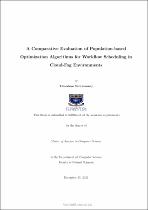| dc.contributor.advisor | Nyirenda, Clement | |
| dc.contributor.author | Subramoney, Dineshan | |
| dc.date.accessioned | 2023-02-23T07:36:42Z | |
| dc.date.available | 2023-02-23T07:36:42Z | |
| dc.date.issued | 2022 | |
| dc.identifier.uri | http://hdl.handle.net/11394/9609 | |
| dc.description | >Magister Scientiae - MSc | en_US |
| dc.description.abstract | Scientific workflows are denoted by interdependent tasks and computations that are aimed at
achieving some scientific objectives. The scheduling of these workflows involve the allocation of the
tasks to particular computational resources, traditionally on the cloud infrastructure. This process
is, however, very challenging. It is associated with high computation and communication costs
because scientific workflows are data-intensive and computationally complex.
In recent years, there has been overwhelming interest in using population-based optimization algorithms
such as Particle Swarm Optimization (PSO) and Genetic Algorithms (GA) for scientific
workflow scheduling, predominantly, in the cloud environments. | en_US |
| dc.language.iso | en | en_US |
| dc.publisher | University of the Western Cape | en_US |
| dc.subject | Genetic algorithms | en_US |
| dc.subject | Cloud computing | en_US |
| dc.subject | Fog computing | en_US |
| dc.subject | Computer science | en_US |
| dc.subject | Cybersecurity | en_US |
| dc.title | A comparative evaluation of population-based optimization algorithms for workflow scheduling in cloud-fog environments | en_US |
| dc.rights.holder | University of the Western Cape | en_US |

